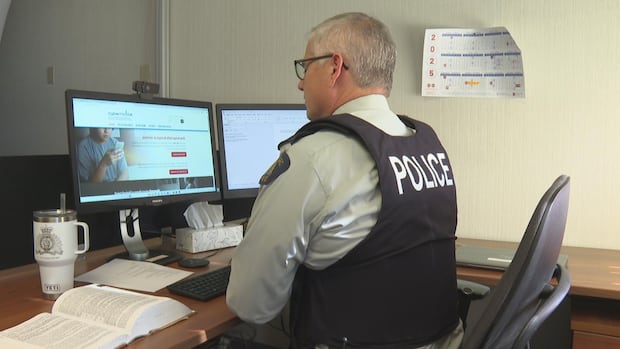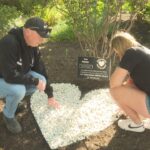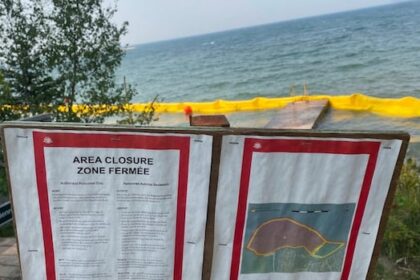PEICharlottetown Police say they investigated a total of 36 complaints of online child exploitation in all of 2024, but so far this year, they have already received 33 allegations.Social media platforms are screening images to see whether they’re sex abuse materialNicola MacLeod · CBC News · Posted: Aug 28, 2025 5:00 AM EDT | Last Updated: 4 hours agoCharlottetown Police and P.E.I. RCMP both say reports of online child exploitation are going up — but they also have the tools to catch the perpetrators. (maradon 333/Shutterstock)Only eight months into the year, Charlottetown Police Services says the force has received more reports of children being exploited on the internet compared to last year.But the same online sphere that enables predators to commit these crimes and share the images with others is also helping police catch wrongdoers.Police in Charlottetown say they investigated a total of 36 complaints of online child exploitation in all of 2024. Charlottetown Police Services has already received 33 such reports in the first eight months of 2025. Those complaints include a range of offences related to child sex abuse, including child pornography, child luring, sexual exploitation and invitation to sexual touching.”The numbers are up, but we are also in a position where we are able to identify these predators online as well,” Det.-Sgt. Darren MacDougall told CBC News on Wednesday.”These types of crimes … they’re occupying a lot of our time. It’s very concerning, very serious, and we all have to do our part in the prevention of this.”Charlottetown Police Det.-Sgt. Darren MacDougall says investigations on these types of online crimes require an allied global effort, but it can get complicated when things happen outside of Canada. (Laura Meader/CBC)Keeping up with technologyLast year, MacDougall said, Snapchat was the online platform most likely to generate alerts to police. So far this year, Kik Messenger seems to be emerging on top.That platform has previously drawn criticism for its appeal to kids with free, easy, emoji-filled chat functions, while also including features that allow users to connect with complete strangers in the name of making new connections. Former P.E.I. substitute teacher Matthew Craswell first came up on the radar of Island police due to his use of Kik Messenger, where he was sharing images and videos that police would later classify as child sex abuse material. We are also in a position where we are able to identify these predators online as well.— Det.-Sgt. Darren MacDougallKik Messenger flagged his activity to the U.S.-based National Center for Missing and Exploited Children (NCMEC), and it was later relayed to Island police. That eventually led to his arrest, and news stories about that led the parent of a Glen Stewart Elementary student to come forward with their family’s story.MacDougall said tips like that also come from the National Child Exploitation Crime Centre in Canada — but whatever the source, investigations can be complicated when the media companies are headquartered in other countries.Their son was a victim of sextortion. They’re speaking out to protect othersThe family of P.E.I. teen Harry Burke is speaking about their son’s death by suicide, which happened less than 12 hours after he shared intimate pictures with a new contact on Snapchat and became a victim of sextortion. Carl Burke and Barbie Lavers hope to raise awareness and protect other teens from sexual predators.”A lot of these offences are occurring using these platforms. Therefore, we have to then engage the American government to collect data that we need in our enforcement efforts,” he said. “It becomes very challenging, I will say.”MacDougall said tracking child predators has become a global effort. Last week, Charlottetown Police charged a 27-year-old man with eight offences related to internet child exploitation. In that case, police said they worked with the U.S. Department of Homeland Security and Europol in the U.K. to identify the accused. The allegations against that man have not been proven in court, but P.E.I.’s legal system is dealing with similar charges on a weekly basis.Last week, another Island man pleaded guilty to several sexual offences involving a teenaged girl he had met through Snapchat. Earlier this summer, a different man pleaded guilty to having sex with a teenage girl he had contacted on TikTok.’Shocking amount’ of youths taking photos of themselvesThe RCMP on P.E.I. are also seeing an increase in reports about child exploitation and related crimes in their jurisdiction. Cpl Gavin Moore with the P.E.I. RCMP says, like the Charlottetown Police, RCMP are receiving more tips and reports about the online exploitation of children. (Laura Meader/CBC)”We take this very seriously,” said Cpl. Gavin Moore, media relations officer for the P.E.I. RCMP.”We have a dedicated team of internet child exploitation investigators.”Moore said that team also receives tips and reports from around the world, and the platforms themselves are using technologies that can detect whether an image might be a sexually exploitative image of a child.Some of those photos don’t involve coerced acts, he added. P.E.I. RCMP officers are seeing a “shocking amount” of self-exploitation — about 33 per cent of the cases they deal with. That involves a youth taking a sexual photo of themselves and sending it to someone online, without being threatened into do so.Even without coercion, the image can still be considered child pornography because the person is underage.”Certainly we want to make sure that those who are vulnerable receive whatever help they need,” Moore said. “Not every file is your typical idea of someone who has committed a crime and there’s a person on the other end who is a target.” Not everyone online is who they say they are— Cpl. Gavin Moore, P.E.I. RCMPMoore said it’s important to still investigate, to ensure no one is behind the scene applying pressure on the youth to take and send the images. He said RCMP will also make house calls to let parents know what their child has been doing online. “It’s important as parents to set ground rules… It’s important to restrict where those devices can be used,” Moore said, noting that photos are often taken in children’s bedrooms when they are allowed to be there alone with their phones.What is sextortion and how does it happen? A P.E.I. RCMP officer explainsSextortion is on the rise, and is up by 150 per cent over the last six months, according to a national tip line to report online exploitation of children. We spoke with the RCMP about this form of online blackmail to find out how it happens — and what parents and young people should know.MacDougall agreed that parents should be aware of what their children are doing online and need to be checking their chat histories, because many of the reports police receive are from parents who have done just that and found something unsettling. “You will see a lot of the online predator/offender soliciting images from a youth under the age of 18, and that is what I would suggest is the most common,” he said.� MacDougall said predators often also pretend to be a fellow young person, providing images supposedly of themselves in order to solicit a return image from a real minor. “Not everyone online is who they say they are,” Moore said. “Not everybody online has the intentions they present.”ABOUT THE AUTHORNicola is a reporter and producer for CBC News in Prince Edward Island. She regularly covers the criminal justice system and also hosted the CBC podcast Good Question P.E.I. She grew up on the Island and is a graduate of St. Thomas University’s journalism program. Got a story? Email nicola.macleod@cbc.caNicola MacLeod on XWith files from Laura Meader
Police getting more online child exploitation reports, but the web also helps catch predators











